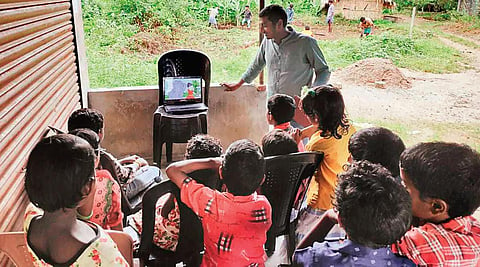

KOCHI: It has been two weeks since the state launched virtual learning for school students to ensure that their studies are not interrupted during Covid lockdown. However, with no access to online platforms and television, 398 students in the 14 tribal settlements in Kuttampuzha forest were completely left out of the virtual learning system.
The absence of electricity and mobile network in the forests had posed a challenge to the departments of tribal welfare and education to provide tribal children access to virtual classes. Finding a solution to the problem, the Samagra Shiksha Kendra under the Kothamangalam Block Resource Centre, in association with the tribal welfare department, has installed solar inverters, DTH and TV sets in the colonies located in the Kuttampuzha forest to help students access classes.
However, challenges remain as low sunlight during rainy days makes it difficult to charge solar inverters. The department has provided laptops to volunteers who copy each virtual class in a pen drive, take it to the colonies and play it for students. Every day, they return to the village to charge the laptop. “Solar inverters and TV sets will be installed at Thalavachapara, Kunchipara and Variyam colonies on Sunday,” Kuttampuzha tribal development officer G Anil Kumar told TNIE.
‘Students in all tribal colonies will have access to virtual classes by Wednesday’
Anil kumar said by Wednesday, students in all colonies will have access to virtual classes. “We have distributed 2,000 books and 1,000 pens to the students. Now, offline classes using laptops are being conducted in four colonies. From Monday, teachers will visit each colony and clear students’ doubts,” he said. The department will also bring in MSW students from various colleges, who will stay in the colonies for a couple of days, and help children with their lessons. “Variyam, Thera and Uriampetti are remote colonies where there are no solar lights. We have provided training to educated youth in these colonies to operate the laptop and explain the lessons to the students.
Virtual classes telecasted over a week are copied to pen drive and distributed to the volunteers who conduct the classes according to a time table. Kothamangalam MLA Antony John helped us find sponsors to purchase TV sets and inverters,” said block project coordinator P Jagadish. However, the residents of Uriampetti colony, located 20 km inside the forest, have a different story to tell. “It has been four years since the panchayat brought 76 solar panels and dumped it in a room.
There has been no effort to install the panels. “How will our children study. Is it practical to go to the village charge the laptop and return every day? Two teachers came here and conducted classes using laptop for a couple of days and left. There are 80 families here and 55 students studying in various classes. They should install solar panel at least for conducting the classes,” said Girish, a resident of the tribal hamlet.
Second phase of ‘First Bell’ from tomorrow
T’Puram: The second phase of the virtual school learning programme ‘First Bell’ will begin on Monday. In the first phase, classes were broadcast through KITE Victers channel and social media as a trial run. The second phase will have the same time allotment — 8.30am to 5.30pm — with the addition of language subjects like Urdu, Sanskrit and Arabic